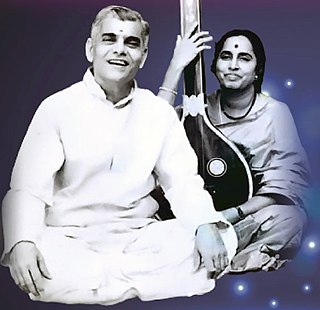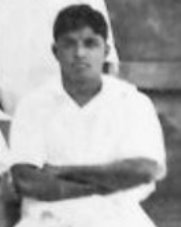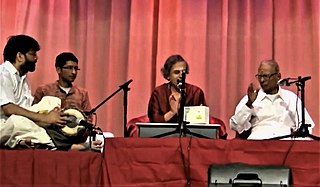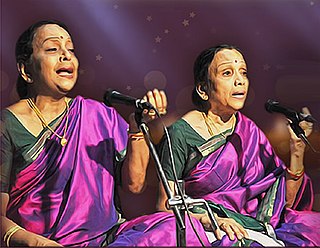
Semmangudi Radhakrishna Srinivasa Iyer was an Indian Carnatic vocalist. He was the youngest recipient of the Sangeetha Kalanidhi awarded by the Music Academy in 1947, a distinction he holds to this day as of 2023, probably the only musician to receive that honour before reaching 40. He had received many other awards as well, including Padma Bhushan and Padma Vibhushan from the Government of India, Rajyasevanirata title from Travancore's erstwhile ruling family, Sangeet Natak Academy award (1953), Isai Perarignar from Government of Tamil Nadu and Kalidas Samman from Government of Madhya Pradesh. He was affectionately addressed as "Semmangudi Maama" by his disciples. He was also considered the "Pitamaha" or the grand sire of modern Carnatic Music. He was conferred with an honorary doctorate by University of Kerala in 1979.

Madras Music Academy is one of the earliest established music academies in South India. Before the concept of infrastructure was introduced to India in the early 1920s, it was a gathering for elite musicians simply called Music Academy It plays an important role in encouraging and promoting primarily the Carnatic Music Indian art form. It played a vital role in the revival of the Indian classical dance form of Bharatnatyam in the 1930s when it faced near extinction due to a negative connotation caused by conservative societal standards.

Palghat Kollengode Viswanathan Narayanaswamy, often referred to as K. V. Narayanaswamy was an Indian musician, widely considered to be among the finest Carnatic music vocalists of the 20th century. He was awarded the Madras Music Academy's Sangeetha Kalanidhi in 1986. He was described as the "Perfect Knight" of Carnatic music, a phrase from Geoffrey Chaucer, by V. K. Narayana Menon, art critic of India and recipient of the Sangeet Natak Akademi Fellowship.

Sudha Ragunathan is an Indian Carnatic vocalist, singer and composer. She was conferred the Kalaimamani award by the Government of Tamil Nadu in 1994, Padma Shri (2004) and Padma Bhushan (2015) by the Government of India, and Sangeetha Kalanidhi by Madras Music Academy in 2013.
Vaidyanatha Sivan was a composer and vocalist of Carnatic music. He was a great exponent of extemporaneous singing. He also composed a ragamalika with all the 72 melakartha ragas.

Mysore Vasudevacharya was an Indian musician and composer of Carnatic music compositions who belonged to the direct line of Thyagaraja's disciples. Vasudevachar's compositions were mostly in Telugu and Sanskrit. Some of his most popular kritis include Broche varevaru ra in Khamas raga, Devadideva in Sunadavinodini, Mamavatu Sri Saraswati in Hindolam, Shankari Ninne in Pantuvarali, Bhajare Re Manasa in Abheri and Ra Ra Rajeevalochana Rama in Mohanam. He presided over Madras Music Academy's annual conference in 1935, when the Sangeetha Kalanidhi award did not exist. But everybody who presided over the annual conference in 1930s was later conferred the award. He was a recipient of the civilian honour of the Padma Bhushan.

Palghat T. S. Mani Iyer (1912–1981), born Thiruvilvamalai Ramaswamy was one of the leading mridangists in the field of Carnatic music. He, along with his contemporaries Palani Subramaniam Pillai and Ramanathapuram C. S. Murugabhoopathy, are revered as the "Holy Trinity of Mrudangam". Mani Iyer was the first mridangist to be awarded the Sangeetha Kalanidhi (1966) presented by the Music Academy of Madras, the Padma Bhushan (1971) and the Sangeet Natak Akademi Awards(1956) presented by the Government of India.

Musiri Subramania Iyer was a Carnatic vocalist whose stage performing career spanned the 1920s to the 1940s. After retirement from the stage, he remained an iconic figure in Carnatic music as a dedicated teacher and leader in the Carnatic community. His bhava-laden renditions of Carnatic songs have become the measuring stick for generations of Carnatic vocalists. Musiri Subramania Iyer is considered one of the giants of Carnatic music in the twentieth century.

Rudrapatna Krishnashastri Srikantan, known as R. K. Srikantan, was a vocalist of the Carnatic musical tradition of South Indian music. He was awarded the Madras Music Academy's Sangeetha Kalanidhi in 1995.
Chingleput Ranganathan was a classical Carnatic vocalist and Guru.

The Bombay Sisters, C. Saroja and C. Lalitha (26 August 1938 – 31 January 2023), were an Indian Carnatic music singing duo. They received the Padma Shri, India's fourth highest civilian honour, in 2020.

Rallapalli Ananta Krishna Sharma was a noted composer of Carnatic music, singer, Telugu litterateur, teacher and Sanskrit scholar. He was responsible for discovering, cataloguing and putting to music many forgotten compositions of Annamacharya. These compositions composed hundreds of years ago came back to life thanks to Sharma's efforts and successive singers like S. P. Balasubramanyam and M. S. Subbalakshmi would sing many of them, hence popularising them. Sharma authored prose works like Vemana, Natakopanyasamulu,Ganakale,Sahitya Mattu Jeevana Kale and Saraswatalokamu. Rallapalli Ananta Krishna Sharma translated 395 Gathas from original Prakrit into Telugu language titled Shalivahana Gatha Sapta Saramu in 1931. Sharma is the recipient of Central Sangeet & Natak Academy Fellowship (1973), Gana Kala Sindhu (1961), Gana Kala Prapoorna (1969), Sangeeta Kala Ratna (1974) and Sangeeta Sahitya Asthan Vidwan honours with an Honorary Doctorate from TTD University, Andhra Pradesh.

Vellore G. Ramabhadran was a Mridangam artiste from Tamil Nadu, India. He was awarded the Madras Music Academy's Sangeetha Kalanidhi in 2004.

Mani Krishnaswami, was a Carnatic music vocalist of Tamil Nadu, India.
Nagercoil Ganesa Iyer (NSG) (1905—1978) was a prominent carnatic musician and exponent.
Valayapatti A. R. Subramaniam is an Indian classical musician and percussionist, considered by many as one of the foremost prominent exponents of thavil also known as dolu, a traditional percussion instrument in Carnatic music, accompanying windpipe instruments such as nadaswaram, saxophone, clarinet, etc, and string instruments like violin, mandolin, etc. He was awarded the Madras Music Academy's Sangeetha Kalanidhi in 2009. He is a recipient of the Sangeet Natak Akademi Award. The Government of India awarded him the fourth highest civilian honour of the Padma Shri, in 2007, for his contributions to Music.
T. K. Govindarao was the first Malayali film musician and a Carnatic musician.











